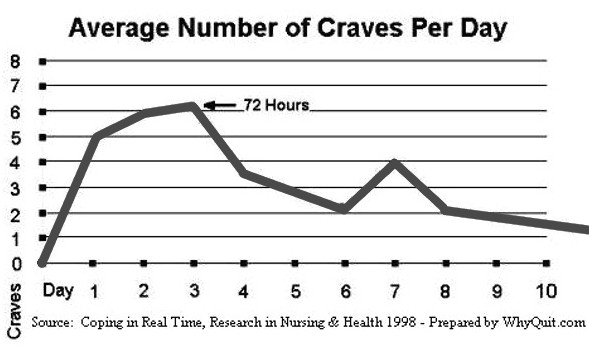 Although this crave chart reflects averages of data from a specific study of a unique population, it shows two factors common to every recovery.
Although this crave chart reflects averages of data from a specific study of a unique population, it shows two factors common to every recovery.
It evidences that the number of daily crave episodes quickly peaks and that the number of episodes then begins to gradually decline.
Let's focus upon what happens once the number of daily crave episodes experienced, if any, begins to decline. I say "if any" because both informed dreams and higher callings have the potential to make recovery significantly less challenging.
Unless hiding in a closet in order to avoid temptation, locked up in prison, laid up in the hospital, or self-isolating due to a virus, we have no choice but to meet, greet and extinguish the bulk of our daily subconscious feeding cues within the first week.
It's then that the number and frequency of early challenges keep us alert, on our toes, prepared and ready to deploy our crave coping defenses on a moment's notice.
As shown by the chart, by day 10 the average study participant was experiencing just 1.4 crave episodes per day. As just reviewed, that translates into less than 7 minutes of significant challenge. But what about the days that follow?
What are the natural and expected consequences of beginning to go entire days without a crave episode? What will happen to your battle plans, defenses, to your preparedness, and anticipation once you experience a day or two without encountering a cue driven crave?
For purposes of discussion only, let's pretend that during recovery days 14, 15 and 16, although you remained occupied in dealing with conscious thinking about wanting to use, that you did not once encounter any un-extinguished subconscious feeding cue or experience any full-blown crave episode.
Although unlikely you would have noticed, wouldn't it be normal to begin to relax a bit and slowly lower your defenses and guard?
And then it happens. On day 17 you encounter a still active use cue.
Surprised, it catches you totally off-guard and unprepared. You scramble to muster your defenses but it's as if you can't find them. It's as if they too are being swept away by a tidal wave of anxieties.
You feel as if you've been sucker-punched hard by the most intense craving ever. It feels endless. Your conscious thinking mind begins suggesting that things are getting worse, not better. The thought of throwing in the towel and giving-up suddenly begins sloshing about inside a horrified mind.
It's then, when things seem worst, that you need to briefly pause and reflect upon what you're really seeing. Things are getting better, not worse. Say, what?
Think about how long it had been since your last significant challenge and how relaxed you'd allowed yourself to become. It's likely that this episode is no more intense than prior ones. It's just that you'd taken off your life jacket and you couldn't quickly locate and put it on. You panicked.
If such an event should ever happen, I encourage you to stop, reflect, and then celebrate! You've reclaimed so many once conditioned aspects of a nicotine-dependent life that serious challenge is no longer frequent.
While infrequent, holiday or even seasonal triggers likely lie ahead, thousands of old wanting satisfaction memories are being written over by a nicotine-free life and gradually losing their punch.
With each passing day, the distance between significant challenges will continue to grow, and they'll be shorter in duration, and generally less intense. Again, remember to keep a clock handy so as to defend against time distortion.
None of us will ever be stronger than nicotine but then we don't need to be. Nicotine is simply a chemical with an IQ of zero. Trust your dreams to your vastly superior intelligence, your greatest weapon of all.
No matter how far we travel or how comfortable we become, there's still only one guiding principle allowing us to remain here on the free side of the bars while keeping our dependency fully arrested on the other ... no nicotine today.
Rewards
And also consider reversing your mind-set. Recovery isn't about punishment but rewards.
Our chemically enslaved survival instincts teacher was fooled and compromised by an external chemical. Its job was to make dopamine pathway activating events nearly impossible in the short term (the time needed for recovery) to forget or ignore.
Except for responding to the wrong input, it functioned as designed. It did its job and did it well. But now it's time for a mind schooled in nicotine dependency recovery to arrive and save the day.
Extinguishing each conditioned use cue rewards us with the return of another aspect of a nicotine-free life. Why fear being able to finish work, a meal, exit a store, drive or have a drink with friends without an urge or crave commanding replenishment?
When a craving arrives, think about the prize at the end. Think about another step in silencing all of them. Think about wanting for more nicotine being permanently evicted from the yard, bathroom, porch, car, work or play, with use no longer chained to relationships, activities, or emotions.
Crave episodes reflect evidence of where we've been, and what we were forced to do once there. But not anymore! The moments in front of you, all of them, are again becoming yours.
Moments of subconscious healing are good, not bad. Soon, you will have reclaimed so many pieces of life that, like putting together your puzzle, it will reflect a life reclaimed.
All rights reserved
Published in the USA
